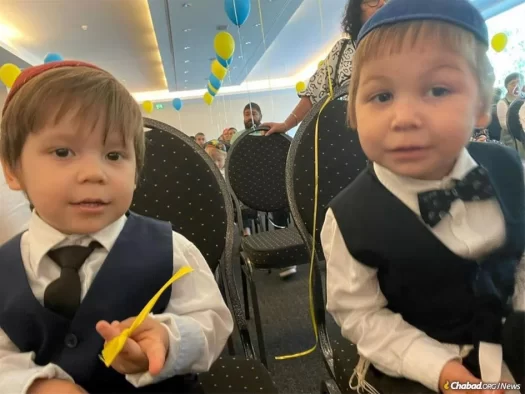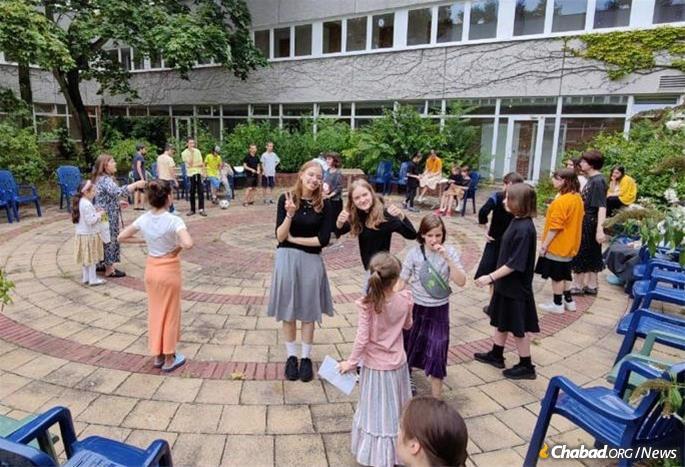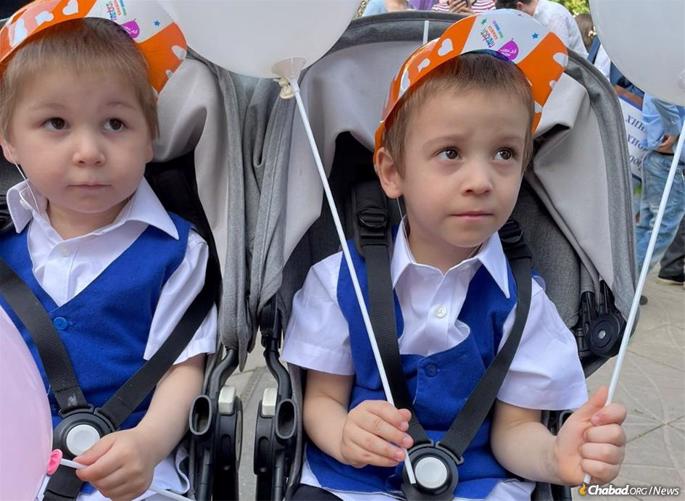
In Odessa, Abandoned Toddler Is Reunited With His 4-Year-Old Brother
by Mendel Super – chabad.org
Two-year-old Anton was found one day in July wandering the streets of Odessa, Ukraine. His mother had disappeared months earlier, and his father had been out of the picture for a long time. Anton’s neighbors and aunt had taken the boy in, but now, with the war plunging Odessa into chaos, Anton was alone. All of 2 years old, he had nobody.
A neighbor brought Anton into Chabad-Lubavitch of Odessa and Chaya Wolff, co-director of Chabad of Odessa, quickly realized upon examining his records that his older brother, Daniel, 4, had already been living in the orphanage she directs for four months. She knew that Daniel had a little brother, but the fog of war made it impossible to find out where he was and who his legal guardian might be.
Wolff and her husband, Rabbi Avraham Wolff, have operated an orphanage in Odessa since 2000, and hundreds of children, including those without living parents and those whose parents weren’t able to care for them, have passed through their doors over the years. In March, they made the decision to evacuate the orphanage to Berlin, where they received a warm welcome from the broader German community, who came out in droves to donate toys, food, clothing and other necessities. Since March, they’ve been hosted with the help of Chabad of Berlin’s Rabbi Yehuda Tiechtal.
Shortly after Passover, another victim of the war joined them. Eleven-year-old Dima was from especially hard-hit Irpin and came to Chabad traumatized by the horrors he’d lived through. Daniel, Anton and Dima were all taken to safety in Berlin. Chaya Wolff, who balances her duties in Odessa and her “adopted children” in Berlin by traveling back and forth, says she hopes the children will be able to return to Odessa by January, but with the situation volatile and sirens still whistling, the future is hard to foretell.
Wolff is currently in Odessa busy preparing for the High Holidays. “A third of our community is still in Odessa,” she tells Chabad.org. “We used to have 40,000 Jews living here, and about 15,000 are still here. Our school and preschool are open with 40 kids in preschool and 120 in day school.”
She describes the ongoing humanitarian work Chabad is engaged in and the plans for the High Holidays.

‘Open Your Hearts’
With a strict curfew still in place at night, Chabad is renting an entire hotel to accommodate families over the holiday, with all services and holiday meals taking place there. Already, 140 families have registered. “We are trying to give everyone a normal holiday,” says Wolff. “We’ve distributed our annual calendar and given out Rosh Hashanah packages to each family, along with apples and honey and honey cake.”
“The war is still going on; we’re still going to the shelters. Businesses are closed, and there’s no food or money,” Wolff continues. With the assistance of the Jewish Relief Network of Ukraine (JRNU), they’ve been steadily providing support with food and essentials. Those who had the good fortune to flee “aren’t the refugees from the USSR of old. They had to pick up and run one day, and they don’t know how long they’ll be gone,” she says.
Even in Berlin, a place where they’ve helped resettle many community members, the situation isn’t easy emotionally: “I can cry just talking about it. They miss their homes. All their past is here. They don’t know if they’ll have anything to come back to.”
“Open your hearts,” she pleads, as the Days of Awe approach, “we need your support to help everyone have a sweeter new year.”
And little Anton? On Sep. 8, he entered into the covenant of Abraham with his bris celebrated in Berlin, where he now regularly sees his older brother. He was named Menachem Mendel, after the Rebbe—Rabbi Menachem M. Schneerson, of righteous memory—who was born not far from Odessa 120 years ago, and who sent his emissaries to revitalize Jewish life there and care for every Jew, just like this sweet 2-year-old.
Those wishing to donate to the Jewish community of Odessa can do so here.
This article has been reprinted with permission from chabad.org













